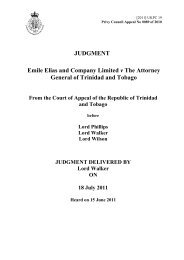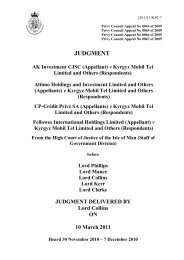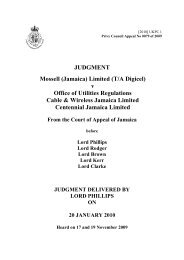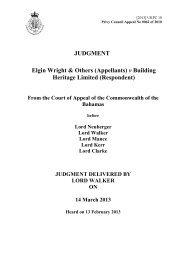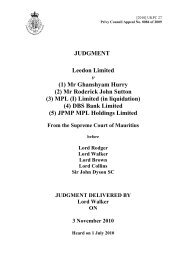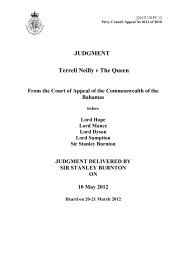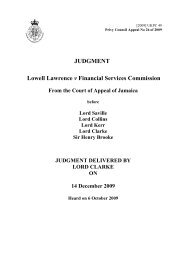Nadine Rodriguez v (1) Minister of Housing of the Government (2 ...
Nadine Rodriguez v (1) Minister of Housing of the Government (2 ...
Nadine Rodriguez v (1) Minister of Housing of the Government (2 ...
Create successful ePaper yourself
Turn your PDF publications into a flip-book with our unique Google optimized e-Paper software.
16. The parties are not agreed on two points. First, has <strong>the</strong>re been discriminatory<br />
treatment at all? Second, if <strong>the</strong>re has, can such discriminatory treatment be justified?<br />
Discriminatory treatment<br />
17. The simple proposition that like cases must be treated alike (and that unlike<br />
cases must be treated differently) begs <strong>the</strong> inevitable question. How do we identify<br />
which cases are alike and which are unlike? When are people in a relevantly similar<br />
situation? There are times when <strong>the</strong> European Court <strong>of</strong> Human Rights surmounts this<br />
hurdle with ease and o<strong>the</strong>r times when it does not. Thus in <strong>the</strong> recent case <strong>of</strong> Burden v<br />
United Kingdom (2008) 47 EHRR 857, <strong>the</strong> majority <strong>of</strong> <strong>the</strong> Grand Chamber held that<br />
two sisters living toge<strong>the</strong>r were not in an analogous situation to civil partners because<br />
marriage and civil partnership were different forms <strong>of</strong> relationship from siblingship.<br />
The problem with that analysis is that <strong>the</strong> ground for <strong>the</strong> difference in treatment, <strong>the</strong><br />
lack <strong>of</strong> marital or civil partnership status, is also <strong>the</strong> reason why <strong>the</strong> person treated<br />
differently is said not to be in an analogous situation. This can be dangerous. If <strong>the</strong><br />
ground for <strong>the</strong> difference in treatment were a difference in sex, it would not be<br />
permissible to say that a man and a woman are not in an analogous situation because<br />
men and women are different. Hence in Burden, Judge Björgvinsson said that <strong>the</strong><br />
comparison should focus, not on <strong>the</strong> differences in legal framework, but on <strong>the</strong><br />
differences in <strong>the</strong> nature <strong>of</strong> <strong>the</strong> relationship as such. He and Judge Bratza concluded<br />
that <strong>the</strong> difference in treatment was justified.<br />
18. The Board considers that <strong>the</strong> same result would be reached in all <strong>the</strong>se cases,<br />
whatever <strong>the</strong> route taken, but in construing <strong>the</strong> Constitution <strong>of</strong> Gibraltar it prefers <strong>the</strong><br />
approach <strong>of</strong> Judges Björgvinsson and Bratza. It would be unfortunate if discrimination<br />
in constitutional and human rights law were to get bogged down in <strong>the</strong> problems <strong>of</strong><br />
identifying <strong>the</strong> proper comparator which have so bedevilled domestic antidiscrimination<br />
law in <strong>the</strong> United Kingdom. There is no need for it to do so, because in<br />
constitutional and human rights law both direct and indirect discrimination can be<br />
justified, whereas in our domestic anti-discrimination law direct discrimination can<br />
never be justified. In R (Carson) v Secretary <strong>of</strong> State for Work and Pensions [2005]<br />
UKHL 37, [2006] 1 AC 173, at para 3, Lord Nicholls <strong>of</strong> Birkenhead preferred to keep<br />
<strong>the</strong> formulation <strong>of</strong> <strong>the</strong> relevant issues under article 14 as simple and non-technical as<br />
possible:<br />
“<strong>the</strong> essential question for <strong>the</strong> court is whe<strong>the</strong>r <strong>the</strong> alleged discrimination, that<br />
is, <strong>the</strong> difference in treatment <strong>of</strong> which complaint is made, can withstand<br />
scrutiny. Sometimes <strong>the</strong> answer to this question will be plain. There may be<br />
such an obvious, relevant difference between <strong>the</strong> claimant and those with<br />
whom he seeks to compare himself that <strong>the</strong>ir situations cannot be regarded as<br />
-8-



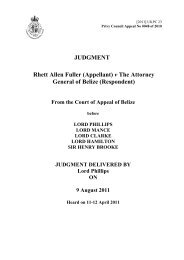
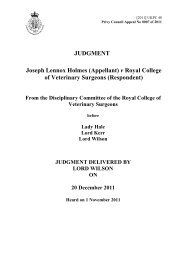
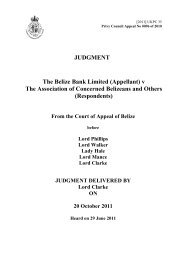
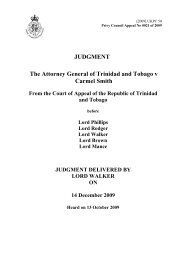
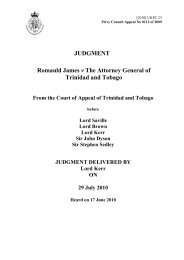
![[2011] UKPC 10 - Judicial Committee of the Privy Council](https://img.yumpu.com/23644185/1/184x260/2011-ukpc-10-judicial-committee-of-the-privy-council.jpg?quality=85)
